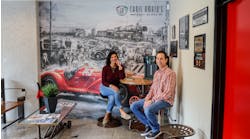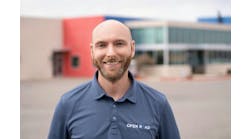|
At a Glance: |
|
Headquarters: Milwaukee |
|
Number of Shop Locations: 21 |
|
Number of States Reached: 3 |
|
Years in Business: 4 |
|
Number of Employees: 220 |
|
Paint Supplier: Multiple |
|
Website: 1collision.com |
As the collision industry continues to consolidate, many independent shop owners have been faced with a choice of selling their business, retiring, becoming part of a franchise. But there are some other models emerging that can help these owners keep their businesses, but still gain some of the advantages found with large MSOs and consolidators.
Based in Milwaukee, Wis., 1Collision Network is a group of 21 shops that service the greater Chicago and Milwaukee areas. Rather than act as a consolidator or a traditional franchise operation, 1Collision has contractual agreements with its shops (which can be individual shops or small MSOs) to provide support services for marketing, operations, and human resources, along with shop management software and other resources. "We also have corporate relationships with strategic partners that the shops would not be able to build themselves," says president Jim Keller.
Keller launched 1Collision Network four years ago after being at the helm of the Crash 1 Network for a decade. Crash 1 had as many has 45 shops at one point, but Keller bought out his partners because they had different visions of how to grow the company.
"I wanted to become a larger operation and provide more services and benefits," Keller says. "I really wanted to focus on marketing, human resources, and insurance relationship building to make this into something bigger."
As a network, Keller says 1Collision can provide shops with benefits they wouldn't have access to as a single shop or small MSO. "We have the corporate structure of a consolidator or large MSO, and we offer virtually all of those services to the locations based on what their individual needs are," Keller says. "A shop might be strong in marketing but need help with operations, while another shop might be very strong in operations but they need marketing support. We can tailor our services rather than have a set package. That makes our pricing more affordable."
That flexible approach has helped the company quickly reach its current size, with nearly 220 employees spread among its shops in three states.
Poised to grow
Although regionally focused right now, Keller says the company plans to expand into the southeastern U.S., while continuing to add locations in the Midwest. The company generally looks for shops that are CIC Class A certified, and that have I-CAR training and management training in place. "We want them to meet all the guidelines for equipment and the ability to fix most vehicles that come into the shop," Keller says. "We want to see evidence of training on the technical and management side, and we look for shops with high CSI rankings."
The company also places a premium on shops that are interested in building out relationships with insurance carriers. "The shops in the network have to have a desire to get into the direct repair program (DRP) environment," Keller says. "They also have to commit to branding with our 1Collision Network brand."
Business dynamics in the collision industry have made the network model appealing to a lot of shop owners. In the Des Moines/Chicago/Milwaukee area, Keller says that there has been a considerable amount of consolidator activity. "A lot of the independents feel they are getting lost in the shuffle with all of the changing of hands and brands in those markets," Keller says. "They all realize that it's no longer a matter of just getting along with the local adjuster or re-inspector. The insurance relationships are happening at a higher level, and at the corporate level."
For shops that are faced with either selling to an MSO or a consolidator, or trying to go it alone, 1Collision offers a third way that can keep them in business at a more competitive level.
"I ran the Crash 1 Network for ten years, and we took that from zero to 45 locations very quickly," Keller says. "What I'm seeing now in the industry is that a lot of shops are at a crossroads. They can go left and sell the shop, and its' a great time to do that. Or they can go it alone and not affiliate with a group. For some that will work, and for others that may be a challenge. The other possibility is to affiliate with a network like 1Collision or Fix Auto or Carstar."
Keller says he sees each of the major collision networks as unique in terms of benefits, and the conditions to participate. "I think for a shop that wants to be part of that growing sector that is increasing market share, they have to take a good look at what their business needs and what the groups offer," Keller says.
Centralized Management Services and Support
While marketing muscle is a major benefit that 1Collision offers to shops, HR support has been a key element as well. "Because marketing is such a big piece of what we do on the consumer and insurance side, when those efforts are successful it creates a need for enhancing or expanding the technician and office staff to take on more volume," Keller says. "Recruiting is a challenge for a lot of shops. We have people dedicated full time to recruiting technicians for shops. We've been successful in placing staff in shops through that recruiting system."
1Collision has also developed a new software platform that can help shops with HR management, covering everything from health insurance to 401K management to onboarding. The cloud-based solution was developed with an outside technology partner. "Many shop owners struggle with that," Keller says. "This is a comprehensive system that can cover everything that happens in an HR department."
The shops in the network use all three of the major estimating systems. While there is some variation in shop management systems as well, Keller says the company is encouraging the shops to standardize on one solution right now. That may become mandatory in the future.
The majority of shops use Axalta as their paint supplier, although some also work with Sherwin-Williams, AkzoNobel and PPG. "We have strategic paint partner relationships where we bring in some of the value added benefits for the shops," Keller says. "For instance, we will host some training on parts procurement or production topics, and we have had paint companies that supply the training rooms and staff for that training."
The company works with an outside provider to measure performance KPIs, which 1Collison uses in discussions with its industry partners and in identifying areas where a particular shop might need some coaching.
1Collison also has a paintless dent repair partner that specializes in hail damage, and has close partnerships with the information providers. There is also an environmental compliance partner that provides compliance training and assistance for the network shops. Other corporate partners include Meguiar's (for detailing) and 3M.
High level insurer relationships
Insurance carrier relationships are another important benefit, and Keller says that working closely with DRPs was part of his plan when he launched the company. "We build bridges for shops at the corporate level with insurers," Keller says. "We talk to them about the performance of our shops, the reasons we are a really good choice for the DRP program for the insurer and the consumer, and we look for opportunities to partner with insurance companies in areas where they have a need and we have locations."
That saves time for the shop owners, who have found it more and more challenging to connect with the right people that can help them get into a program. A network also provides built-in accountability.
"The consolidators have proven that by having deeper relationships with insurance companies, and by offering more than the average shop to the insurance company, they can deliver on those commitments," Keller says. "The shops have a commitment to each other in the group to do all of the right things and perform well. They would be letting the group down if they didn't."
1Collision Network also provides a single contact for the insurance company, so that the application process for all of the shops can be handled centrally. From the insurance company's perspective, that's much easier than working with all of those shops individually.
Staying ahead of the competition
For the shops, the key benefits of joining 1Collision are being able to take advantage of the corporate relationships the company has with the insurers and its corporate partners. The network also provides an opportunity to share knowledge and innovations with other shop owners. "They get to know each other and help each other," Keller says.
The shops are also able to receive specialized training from equipment companies that 1Collision has partnered with. "We're bringing value to the shops that they haven't always had before, and that would be difficult for them to get on their own," Keller says.
As he talks to shop owners across the region, Keller says that the biggest challenge the industry faces right now is just deciding what to do next. "Shops aren't sure what way to go, and the options available are really clouding the decision," he says. "Instead of staying independent or franchising, there is a big opportunity to sell that has it made it more difficult to decide. A lot of shops are in limbo."
Technology also poses a challenge for shops that require more certifications in order to repair vehicles that are increasingly complex. "More of those OEMs are rolling out requirements, so for an individual shop owner to try and figure out how to connect with all of the companies and get the certifications, that would be a big challenge," Keller says. "One thing we're working on right now is connecting with the OEMs and staying in touch so that we're out in front of those requirements for our network members."
Insurance companies are also encouraging customers to seek out shops with specific OE certifications, which has put more competitive pressure on the shops. "The more sophisticated shops will have the most opportunity," Keller says. "We have to adjust and that's part of what we hope to bring to the table as we build out our network. We're staying on top of what's changing in the industry and coming up with solutions so our shops can be ahead of the game instead of behind.
"We're trying to turn those challenges into opportunities that will make the shops of the future successful," he continues. "If OE certifications or converting for aluminum are the challenges we're facing, we need to figure out how to be a part of that."


